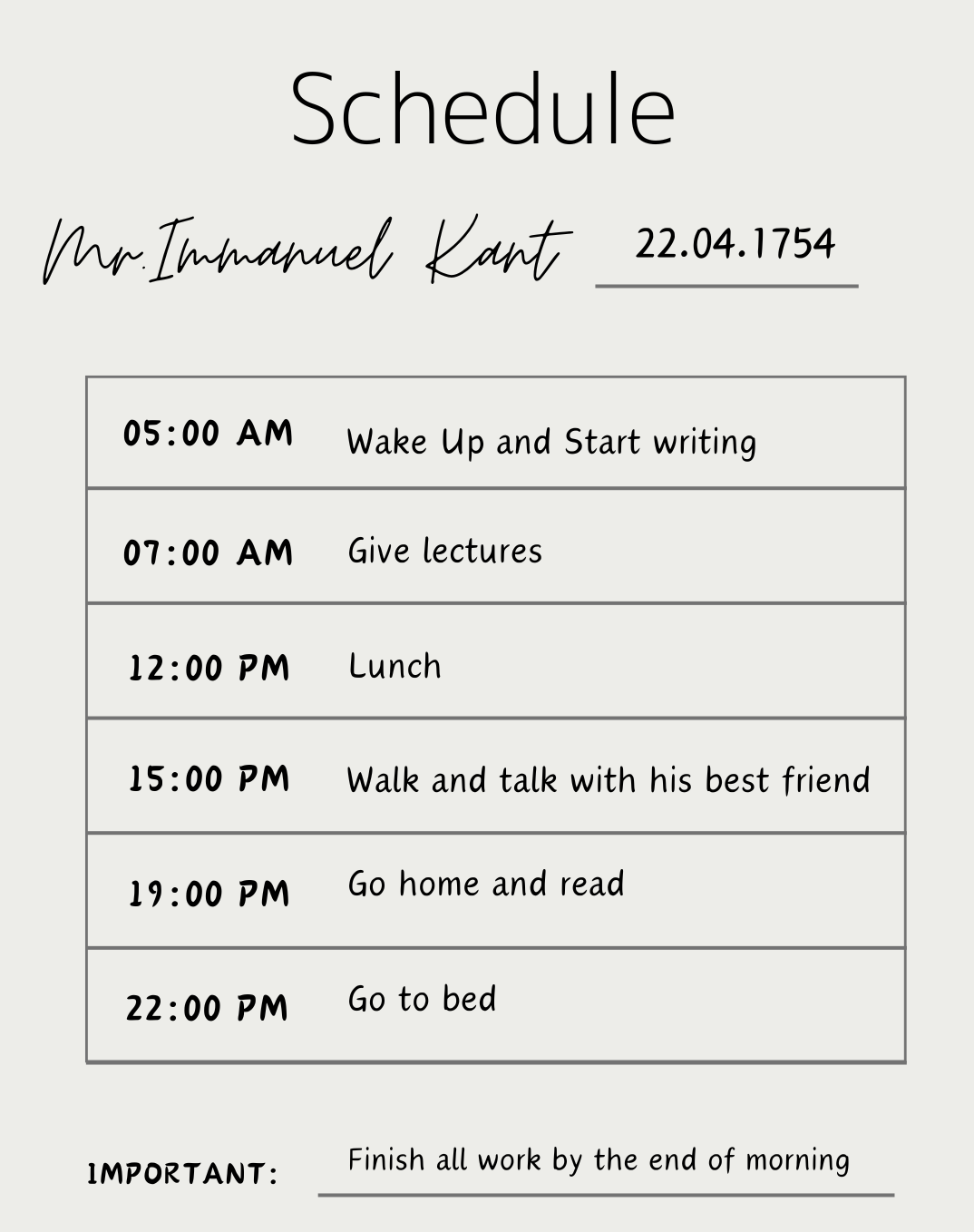Great Men’s Boring Daily Life

We often imagine that the daily lives of geniuses must be extraordinary and groundbreaking. However, their routines are surprisingly mundane. What makes a genius isn’t necessarily excitement, but rather a consistent and often monotonous routine. This post is perfect for anyone who wants to:
- Maximize your potential and achieve great goals.
- Learn about the daily lives of historical figures.
- Become a genius!
- Conclusion: 7 Common Boring Routines of Great Men
- Examples of Mr. Routines
- Summary
7 Common Boring Routines of Great Men
- Early rising
- Morning chores
- A simple diet
- Daily walks
- Taking notes
- Gathering information
- Interacting with people
Looking at the list above, you might share Piyoko’s reaction. But the secret to creativity often lies in the repetition of a simple routine. Let’s dive into the daily habits of some historical figures!🐣
Examples of Mr. Routines
Mr.Immanuel Kant

Kant was a renowned philosopher, famous not only for his ideas but also for his strict routine. It’s said that he followed his daily schedule so precisely that neighbors could set their clocks by his activities. A very symbolic episode said,
When Mr.Kant leave home, it’s 15:00 PM.
As soon as he woke up at 5 a.m., he’d have a cup of coffee and dive straight into his creative work—writing. He reserved the morning for output, making the most of his fresh mind.
After his morning writing session, Kant would lecture at the university from 7 a.m. until noon, followed by a simple lunch. His only request for lunch was that the meat be well-done.
Once his work was done, Kant would go for a long walk, often lasting 1-2 hours. During these walks, he meditated and jotted down ideas, eventually ending his stroll with a visit to his friend, Joseph Green. He’d then spend his evening reading and collecting information, before going to bed at 10 p.m.
Let’s look at some other Kant-like geniuses!
Mr. Ludwig van Beethoven.
Given Beethoven’s genius, we might imagine his daily routine was equally artistic. However, his masterpieces were born from a strict routine!
But no, Beethoven woke up at dawn and started his day with coffee. He was so particular that he counted exactly 60 coffee beans every morning!
After coffee, he composed music in the morning, took a simple lunch, and then went for a walk at 3 p.m. In the evening, he’d read the newspaper at a crowded bar—this was his time for input.
Mr. Pyotr Ilyich Tchaikovsky.
Tchaikovsky also woke up at 7 a.m., starting his day with tea and tobacco. After working in the morning, he went for a two-hour walk. He strongly believed that walking was essential for his creativity. Like the others, he kept a pencil handy to jot down ideas during his stroll.
Mr. Sigmund Freud
Freud also woke up at 7 a.m. and had his beard shaved by a barber every morning.
He walked every day, but at a brisk pace🏃♂️. In the evening, he’d have dinner with his family and enjoy card games with them.
Freud also took three-month vacations with his family, where he indulged in activities like strawberry picking, mushroom foraging, and fishing.
🍓🍓🍓🍓🍓🍓🍓🍓🍓🍓🍓🍓🍓🍓🍓🍓🍓🍓🍓🍓🍓🍓🍓🍓🍓🍓🍓🍓🍓🍓🍓🍓🍓🍓
Summary
- Start with output in the morning, and save input for the evening.
- Keep breakfast and lunch light.
- Take a 1-2 hour walk to let creativity flow.
- Make time for social interaction in the evening.
This blog post draws inspiration from the insights found in Daily Rituals: How Artists Work by Mason Currey, which explores the daily routines of some of history’s most creative minds.








